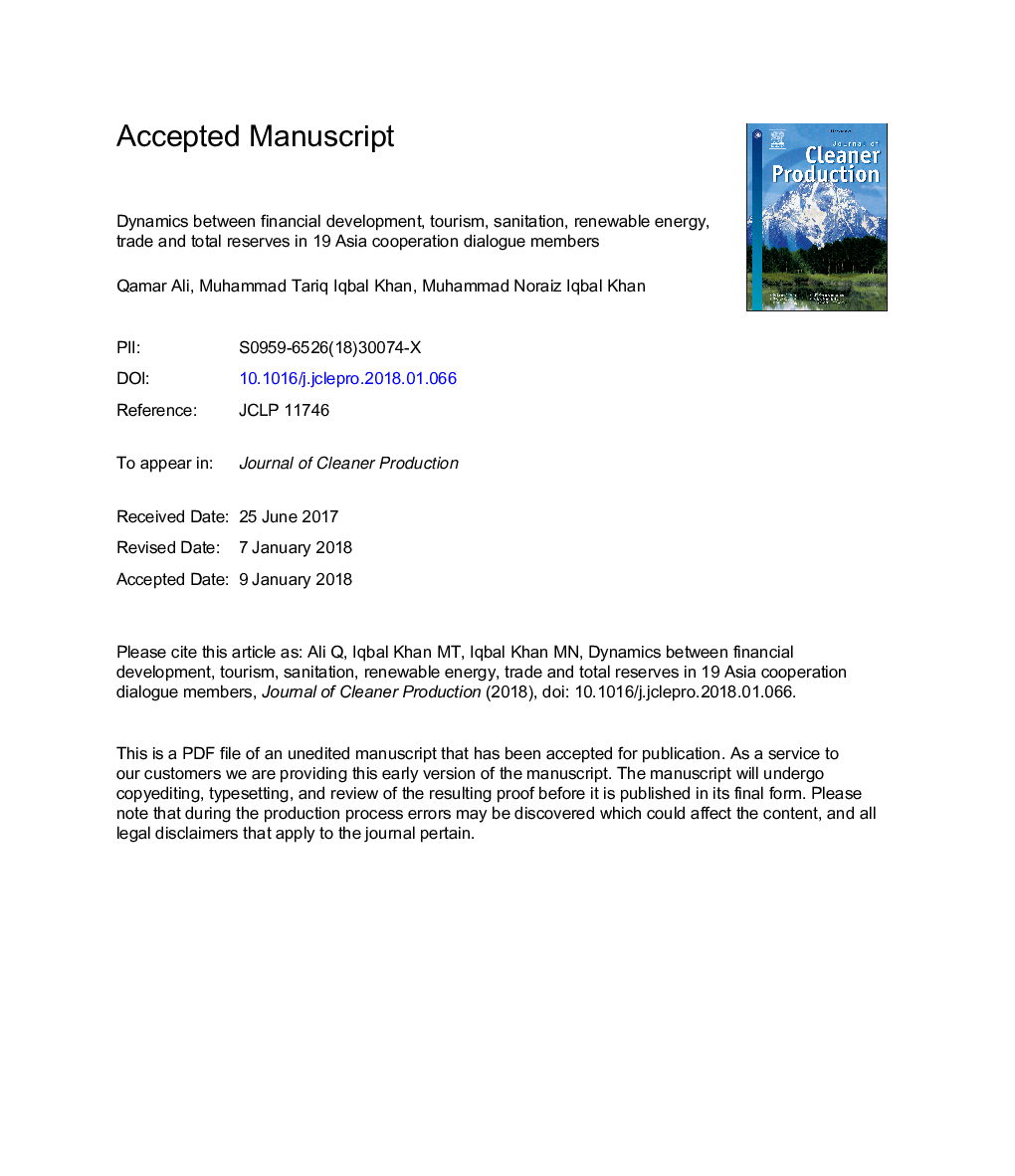| کد مقاله | کد نشریه | سال انتشار | مقاله انگلیسی | نسخه تمام متن |
|---|---|---|---|---|
| 8098160 | 1522074 | 2018 | 63 صفحه PDF | دانلود رایگان |
عنوان انگلیسی مقاله ISI
Dynamics between financial development, tourism, sanitation, renewable energy, trade and total reserves in 19 Asia cooperation dialogue members
ترجمه فارسی عنوان
دینامیک بین توسعه مالی، گردشگری، بهداشت، انرژی تجدیدپذیر، تجارت و ذخایر کل در 19 عضو دایره همکاری در آسیا
دانلود مقاله + سفارش ترجمه
دانلود مقاله ISI انگلیسی
رایگان برای ایرانیان
موضوعات مرتبط
مهندسی و علوم پایه
مهندسی انرژی
انرژی های تجدید پذیر، توسعه پایدار و محیط زیست
چکیده انگلیسی
A satisfactory level of total reserves is required for the stabilization of development process. It is a challenge for developing countries to increase total reserves in order to make timely payments for the imports. This paper explored the dynamics between total reserves, financial development index, improved sanitation, renewable energy, trade openness, and tourism by using panel data from 1995 to 2015 in 19 Asia Cooperation Dialogue member countries, divided into three panels with respect to income. Prior to empirical analysis, the stationarity in each variable series was explored by using four unit root tests. The Kao cointegration test confirmed the long-run association between the selected variables. The results of vector error correction model confirmed the long run causality for total reserves, financial development, renewable energy, sanitation, and tourism in high income countries (HICs); total reserves, financial development, and trade in upper middle income countries (UMICs); and financial development, renewable energy, and sanitation in lower middle income countries (LMICs). The total reserves revealed the growth hypothesis with tourism (HICs), sanitation (HICs, UMICs), and financial development (LMICs); conservation hypothesis with trade (HICs), financial development (UMICs), and renewable energy (UMICs); and feedback hypothesis with renewable energy (HICs), and sanitation (LMICs). The fully modified ordinary least square was used to estimate the long run elasticity coefficients. The increase in total reserves due to 1% increase in sanitation was 4.704% and 2.941% in UMICs and LMICs, respectively. The increase in total reserves by 1% increase in tourism was 1.079%, 0.521%, and 0.413% in HICs, UMICs, and LMICs, respectively. The increase in total reserves was 1.462% and 0.814% due to 1% increase in financial development and trade openness, respectively in HICs. The country-wise analysis also supported the panel results. The increase in total reserves was found due to increase in improved sanitation (14 countries), tourism (9 countries, renewable energy (7 countries), trade (6 countries), and financial development (5 countries). The policymakers should primarily focus on improved sanitation, and tourism followed by financial development, trade, and renewable energy.
ناشر
Database: Elsevier - ScienceDirect (ساینس دایرکت)
Journal: Journal of Cleaner Production - Volume 179, 1 April 2018, Pages 114-131
Journal: Journal of Cleaner Production - Volume 179, 1 April 2018, Pages 114-131
نویسندگان
Qamar Ali, Muhammad Tariq Iqbal Khan, Muhammad Noraiz Iqbal Khan,
